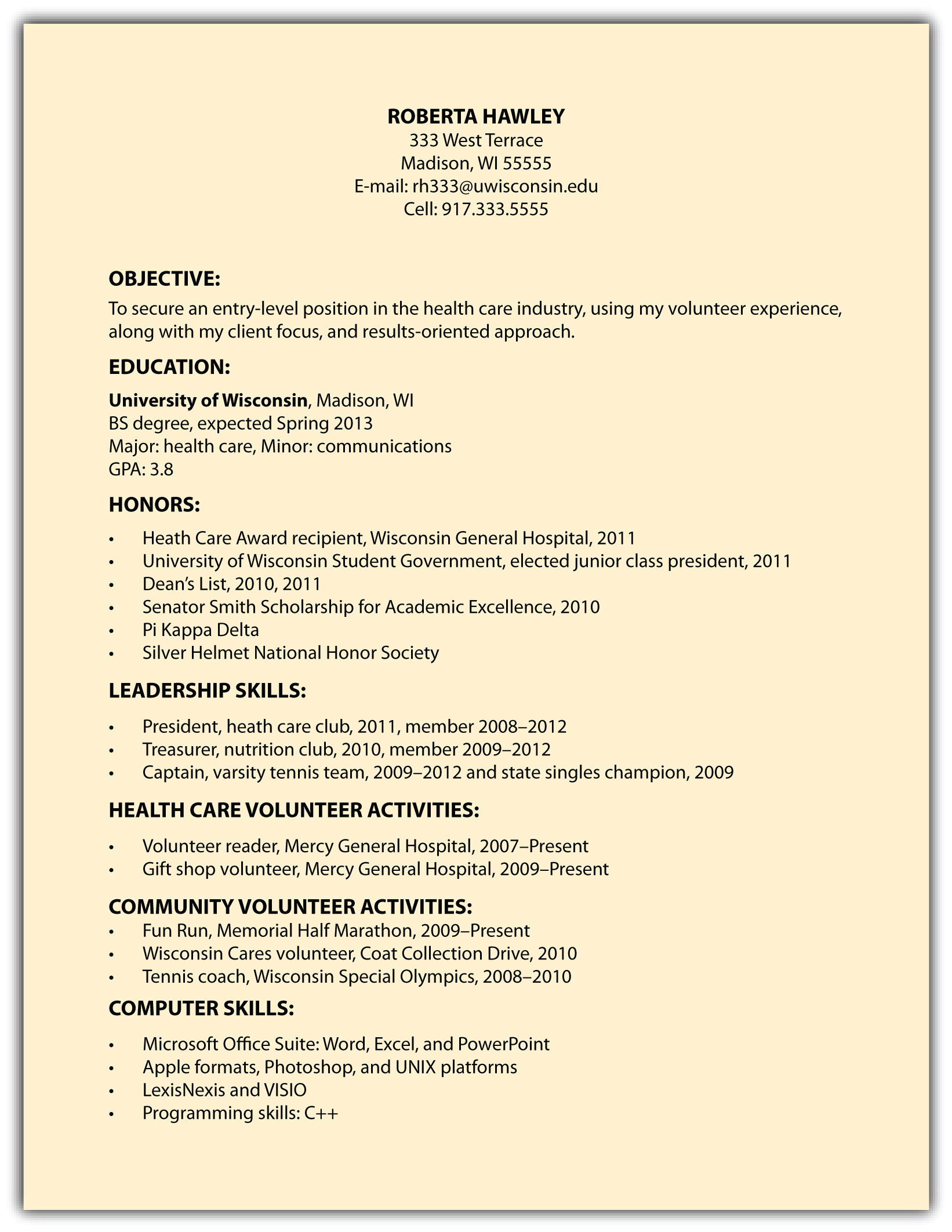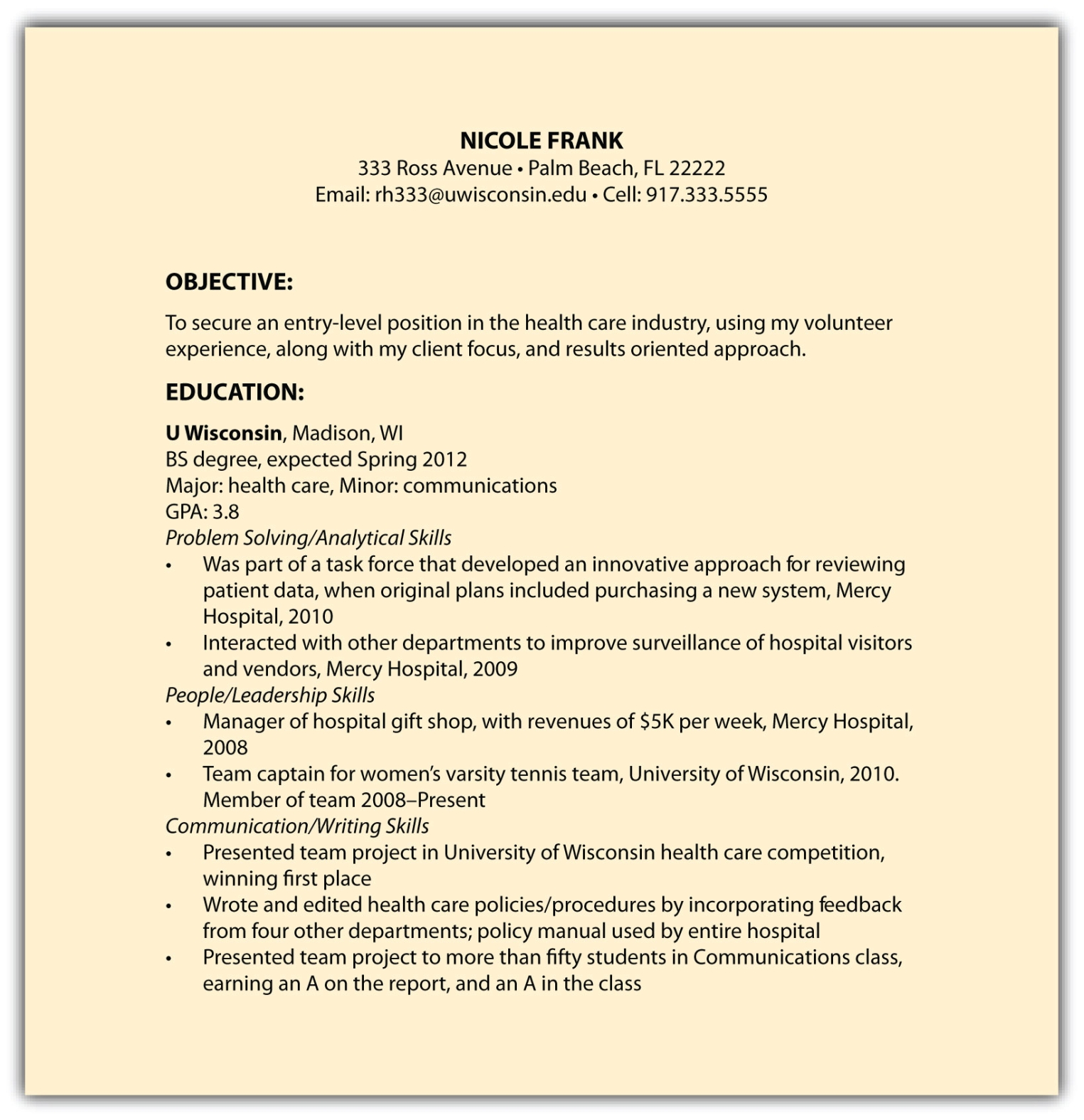This is “Other Résumé Formats, Including Functional Résumés”, section 4.6 from the book Job Searching in Six Steps (v. 1.0). For details on it (including licensing), click here.
For more information on the source of this book, or why it is available for free, please see the project's home page. You can browse or download additional books there. To download a .zip file containing this book to use offline, simply click here.
4.6 Other Résumé Formats, Including Functional Résumés
Learning Objectives
- A chronological résumé has the most-expected résumé format, and while it’s good to give a résumé reader what they expect, it’s also helpful to know about other types of résumé formats.
- A functional résumé highlights skills versus specific work experiences.
- A functional résumé can be used when you think employment gaps or the lack of employment can hurt your candidacy.
Functional Résumés
This chapter thus far has reviewed a résumé that follows a chronological format. Another format to consider is a functional résuméAs opposed to a chronological résumé, offers a different emphasis on a candidate’s accomplishments and background., which highlights the skills you’ve developed more than the individual jobs you’ve held.
Functional résumés can be different from what most recruiters will review, so it’s best to proceed with care. This includes consulting a career services office and consulting a professional résumé writer.
It’s important to note that throughout the many, many years that individuals have been drafting résumés, recruiters have expected to see a chronological résumé with certain sections: employment, education, and additional information. In most cases, it’s best to give recruiters what they expect: a chronological résumé.
With that understood, functional résumés can be used for college students and experienced candidates for the following reasons:
- Individuals may want to highlight their skills and achievements rather than the companies for which they worked.
- College students who do not have a strong work experience history can use a functional résumé to give them a chance to include other achievements, honors, and abilities in a very pronounced way.
- Experienced individuals can deemphasize gaps in employment because recruiters often notice gaps and then want those gaps explained.
- Experienced individuals can also deemphasize career mobility and emphasize skills and achievements.
Here are some categories you may want to consider when drafting a functional résumé:
- Communication skills
- Teamwork skills
- Leadership skills
- Honors and special achievements
- Athletic involvement and achievements
- Volunteer experiences
Figure 4.4 "Sample Functional Résumé 1" and Figure 4.5 "Sample Functional Résumé 2" are examples of how a functional résumé might look.
Figure 4.4 Sample Functional Résumé 1

Figure 4.5 Sample Functional Résumé 2

Curriculum Vitae (CV)
Some people interchange the word résumé with curriculum vitae (CV)Used internationally, particularly for research-oriented positions. A CV is often longer and more detailed than a résumé., which is incorrect because they are different items. A CV is mostly used internationally, particularly for research-oriented positions. A CV is often longer and more detailed than a résumé. In some cases, CVs are six to eight pages long and include published material and conference information if the person presented information to colleagues. A CV may or may not include biographical information, including marital status and nationality (this is typically the case with international students studying in the United States).
With this said, a résumé is the appropriate document when seeking any nonacademic or nonclinical position in the United States. If you are interested in working overseas, use research to familiarize yourself with an employer’s expectation regarding résumés, CVs, and additional information.
Key Takeaways
- Functional résumés are not what most recruiters expect, but they have certain advantages that can help your candidacy.
- Functional résumés highlight specific strengths rather than the name of the company for which you worked.
- CVs are very different from résumés because CVs, which often are used for research-oriented positions, can sometimes be six to eight pages in length.
Exercises
- Think about how you would construct your résumé in a functional format versus a chronological format.
- Decide which format works best for you: chronological or functional.
- Review and critique this information with a classmate.




